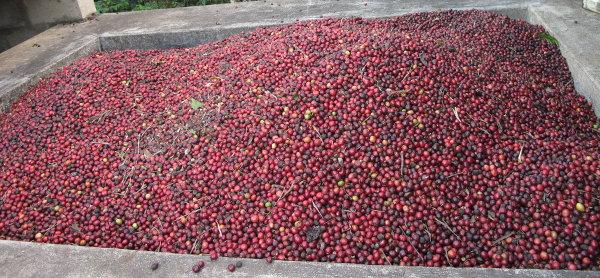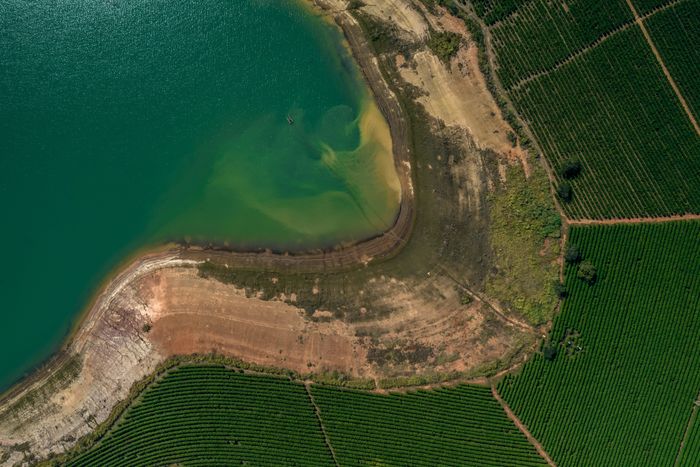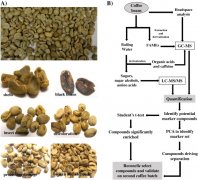Effect of High temperature and drought in Brazil on Coffee Bean Agricultural products; World Coffee Bean production is on a sharp decline
The price of coffee soared after a poor harvest and unmet demand
Global consumption will exceed production this year as Brazil suffers from the worst drought in nearly 20 years.

Global coffee prices are rising and could push up the cost of breakfast tables as Brazil, the world's largest coffee producer, faces one of the worst droughts in nearly a century.
The price of Arabica coffee beans, the main variety produced in Brazil, hit its highest level since 2016 last month. Arabica coffee futures traded in New York have risen more than 18 per cent to $1.51 a pound in the past three months. Robusta coffee, which is traded in London, a stronger flavor popular in instant coffee, has risen more than 30 per cent in the past three months to $1749 a tonne, a two-year high.
Brazilian farmers are preparing for one of the biggest declines in yields in nearly 20 years after months of drought withered plants. Brazil's Arabica coffee crop cycles between a year of prosperity and a year of weakness. After a record harvest in 2020, 2021 will be a weaker year, but the decline will be more severe than expected.
This year, Brazil's total coffee harvest is expected to see the biggest year-on-year decline since 2003, according to the U.S. Department of Agriculture. Its Arabica coffee production is expected to decrease by nearly 1500 million bags of 132-pound bags of coffee compared with 2020.
Others are guarding against a bigger recession. Rabobank, the Dutch agricultural bank, expects the harvest to fall by 1700 million bags, while commodity brokerage ED&F Man, whose Volcafe division is one of the world's largest coffee traders, expects to lose more than 2300 million bags.
Global coffee consumption is expected to exceed production this year for the first time since 2017, according to the USDA. The department expects to consume 165 million bags of coffee beans in 2021, 1.8 million more than last year. At the same time, global coffee production is expected to fall to 1.648 billion bags.
There are other factors behind the rise in prices. Colombia and Vietnam, two other major producers, have much better harvests than Brazil, but are struggling with a different problem: Port delays leave beans idle on the docks.
Exports of Colombian coffee have fallen as anti-government protesters have blocked highways and ports, and baristas are particularly popular because of their mild flavor. Container shortages and soaring freight rates have hit Vietnamese farmers, who produce more than 1/3 of the world's robusta coffee.
Carlos Mera, head of agricultural commodity market research at Rabobank, said: "there is not only a significant increase in costs across the supply chain, but also massive delays." Unlike other goods that can be transported by bulk carriers, coffee can only be transported globally in containers, he said.
Investors are also playing a role, betting that commodities will benefit from generally rising prices. Mr. Mera says some investors have pushed up the price of coffee by putting money into commodity index funds, which track a basket of commodities from industrial metals to coffee and cocoa.
In Brazil, farmers say their remaining stocks are dwindling after last year's bumper harvest, and they fear they may run out before next year's harvest begins.
"We are a little worried about not selling enough next year," said Jose é Marcos Magalh ã es, president of the Minassur Coffee Cooperative. He said that the cooperative urged members to provide the cooperative with any coffee they had so that it could continue to meet its orders.

Coffee lovers can still find a respite. Steve Pollard, a coffee analyst at brokerage firm Marex, said spring rains in Brazil usually occur in September, which is crucial to determine whether damaged coffee plants can recover and produce enough beans during next year's harvest.
Another option, he says, could lead to higher prices. Coffee trees take about 2.5 years to grow, and farmers cannot react quickly by simply planting more crops. "if there is a serious deficit, then prices could soar," he said.
Important Notice :
前街咖啡 FrontStreet Coffee has moved to new addredd:
FrontStreet Coffee Address: 315,Donghua East Road,GuangZhou
Tel:020 38364473
- Prev

What is the difference between good and bad coffee beans?
Have you ever wondered why coffee beans go bad? What are the defects of coffee beans? Why do they have such defects? Today, Qianjie Coffee will take you to see what kinds of defective beans are and the reasons for the formation of defective beans! Coffee processing usually begins on the same day as the fruit is harvested to prevent unwanted fermentation that could alter the chemical properties of the coffee beans. this
- Next

Why more sleepy coffee after drinking coffee more sleepy coffee drinking more sleepy six factors coffee diuretic and toxic?
Do people usually drink coffee? I believe that many of the workers in this room live on coffee. Give up soy milk in the morning and use coffee to wake yourself up when you want to go back to sleep. But sometimes no matter how much you drink, the eyelids or everyone, or even refreshing into hypnosis. Why is it useless to drink coffee, but more sleepy? Will you, too? Actually, it's because of drinking the wrong coffee! Drink the wrong coffee, you must
Related
- Detailed explanation of Jadeite planting Land in Panamanian Jadeite Manor introduction to the grading system of Jadeite competitive bidding, Red bid, Green bid and Rose Summer
- Story of Coffee planting in Brenka region of Costa Rica Stonehenge Manor anaerobic heavy honey treatment of flavor mouth
- What's on the barrel of Blue Mountain Coffee beans?
- Can American coffee also pull flowers? How to use hot American style to pull out a good-looking pattern?
- Can you make a cold extract with coffee beans? What is the right proportion for cold-extracted coffee formula?
- Indonesian PWN Gold Mandrine Coffee Origin Features Flavor How to Chong? Mandolin coffee is American.
- A brief introduction to the flavor characteristics of Brazilian yellow bourbon coffee beans
- What is the effect of different water quality on the flavor of cold-extracted coffee? What kind of water is best for brewing coffee?
- Why do you think of Rose Summer whenever you mention Panamanian coffee?
- Introduction to the characteristics of authentic blue mountain coffee bean producing areas? What is the CIB Coffee Authority in Jamaica?

